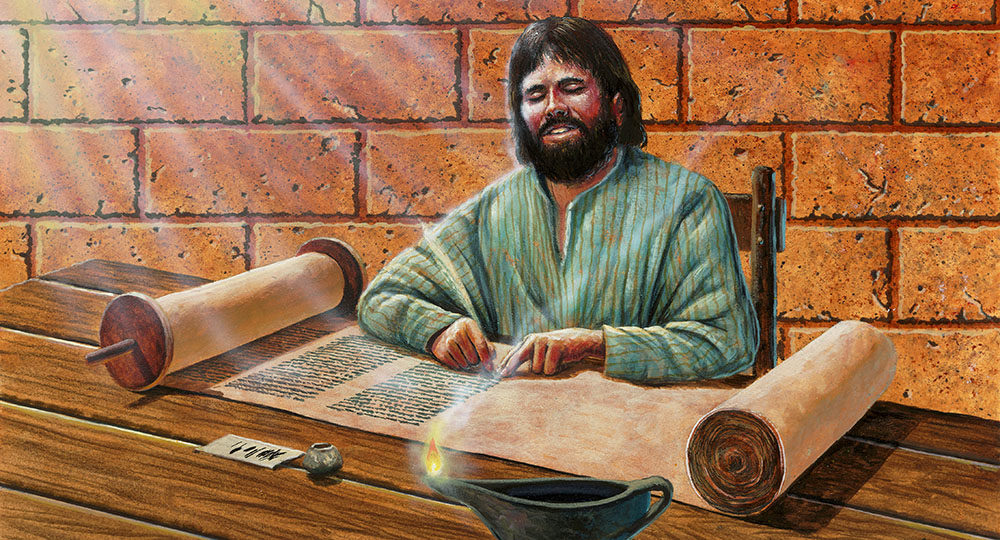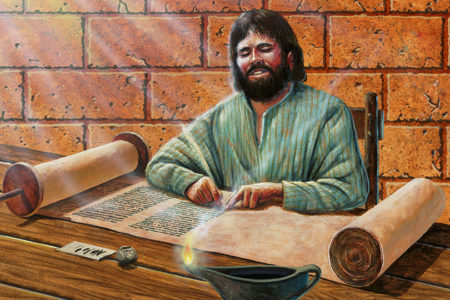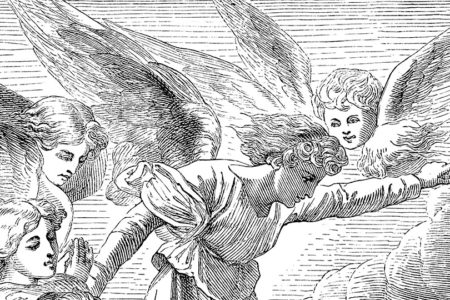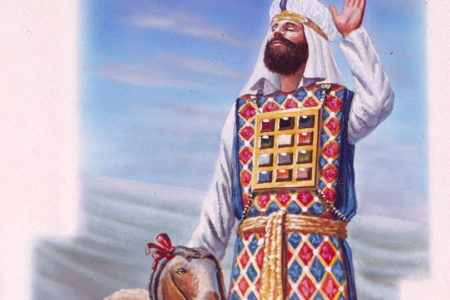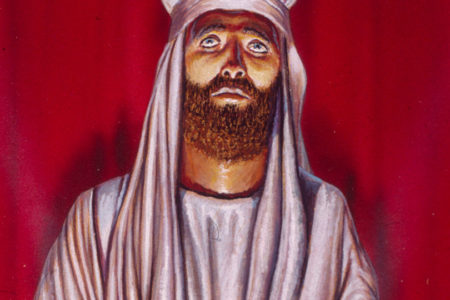Jesus Is Better Than the Prophets
Something within human beings compels them to look for something new—a better way, better quality, better fashion. “Build a better mousetrap,” youngsters of another generation were told, “and the world will beat a pathway to your door.” In reality, this reflects a quest for perfection. And while mankind’s obsession over millennia has been to hotly pursue perfection, like some will-o’-the-wisp, it inevitably dances away, just out of reach, as if to taunt the seeker.
Of all the efforts expended to find perfection in various venues of life, none is more earnestly sought than in the spheres of religion and self-fulfillment. Religious pursuit is a universal quest that is in some way served by every facet of humanity. The first word encountered in the Book of Hebrews in our English Bible is the word God. The writer, whose identity cannot be confidently asserted, assumes that God exists and that readers are aware of His existence. The unbeliever—unreligious, thus godless—is written off as “The fool” (Ps. 14:1) in the Word of God.
The Epistle to the Hebrews eloquently ends mankind’s search for a better way, better things, and a better climax to their existence, for in this book we discover that we need not accept William Ernest Henley’s statement, “Beyond this place of wrath and tears looms the horror of the shade.” Henley’s defiant “Invictus” portrays a bravado with a hollow ring that, in the end, bemoans life’s passing with, in the words of another, the solemn lament, “after this, the dark.”
In a sense, the Epistle to the Hebrews is the final arch in the superstructure of God’s redemptive plan for mankind. The context, which must be carefully observed, directs us to first-century Jewish believers. The Temple was still standing on Mount Moriah, and devout Jewish people from all sectors of the known world went there to observe the ceremonies and sacrifices prescribed for the nation of Israel. To that point, God had progressively revealed a marvelous program for ending mankind’s search for a better way and for assurance that eternity holds more than dark shadows. It was, in actuality, the only system that could bring a semblance of assurance that one had found favor with the Lord of creation.
As marvelous as this system was, however, and superior to anything else the world’s religions had to offer, it was fragmentary and of necessity incomplete, for during the Old Testament era, “God … at sundry times and in diverse manners spoke in time past unto the fathers by the prophets” (Heb. 1:1). God had, indeed, spoken to His Jewish people, but it had been through various sources and in many ways. Some 40 writers labored for more than 1,500 years to deliver the 39 books of the Old Covenant. History, biography, genealogy, legislation, religious ordinances, spiritual experiences, and prophecy all contributed to the fabric of the revelation He gave to the fathers of Israel. At times the Spirit spoke directly to His servants, sometimes through the agency of angels or even in theophanies (appearances of God Himself as the angel of Jehovah). At times it was through divine wisdom conferred or words put in the mouths of His prophets and, at other times, through prophetic visions or dreams of the night. But the essential point was that God was speaking, His Word was being communicated through human agents. In Hebrews 1:1 the prophets are identified as those who faithfully communicated God’s Word to the chosen people.
The Prophets
The office of prophet in the old economy differed from that of priest or king. Priests and kings generally received their positions through heredity. No one was made a prophet, however, because no human individual or official possessed the authority to appoint a prophet. Prophets were God-called, God-anointed men commissioned to bring the Word of Jehovah to His people. Therefore, the prophet was a unique instrument in the hand of God. The responsibility of a prophet was to communicate the Word of God on His behalf. Strictly speaking, the work of a prophet was not so much to fulfill an office as to perform a divinely appointed function. Although the Lord chose to use the minds and personalities of the prophets when they recorded and communicated His Word, they were totally controlled by the Holy Spirit. Second Peter 1:21 verifies that fact: “For the prophecy came not at any time by the will of man, but holy men of God spoke as they were moved by the Holy Spirit.” Further confirmation is given in 2 Timothy 3:16: “All scripture is given by inspiration of God, and is profitable for doctrine, for reproof, for correction, for instruction in righteousness.” The declaration refers, of course, in the main, to the Old Testament Scriptures.
Although the greatness of the prophets was never ignored or downgraded by God, all that they brought to the scene over the centuries was not enough to complete the story. In Hebrews 11 we learn that for all their steadfast commitment to God and delivery of His Word, the prophets, like their illustrious contemporaries in the faith, “died in faith, not having received the promises but having seen them afar off, and were persuaded of them, and embraced them, and confessed that they were strangers and pilgrims on the earth. For they that say such things declare plainly that they seek a country.” Their pursuit of that better country was confined to the mists of partial revelation; only in a future day would they behold the full dimensions of the city He was preparing for them (Heb. 11:13–16).
Christ Is Better Than the Prophets
As we shall see in the articles to follow, Hebrews is a book of successive superiorities. “Better than” is the repetitive phrase. But before the Holy Spirit, moves us into revelation about the Messiah’s superiority over other personalities and elements in the Old Testament system, He identifies His essential qualification as the one “better than” all that had gone before.
In saying this, I am not diminishing the role of the prophets or implying that a competitive posture existed between Jesus and His Old Testament forerunners. Their ministries were essential to the entire process of erecting the house of faith. As God-enabled human instruments, the prophets could only lay the foundation and move the process along the way; they could never finish the construction. Their part was contributing to the clarification of the promise. Jesus came to consummate fulfillment. “Think not that I am come to destroy the law, or the prophets; I am not come to destroy, but to fulfill” (Mt. 5:17).
The first chapter of Hebrews answers a series of questions posed in the Book of Proverbs: “Who hath ascended up into heaven, or descended? Who hath gathered the wind in his fists? Who hath bound the waters in a garment? Who hath established all the ends of the earth? What is his name, and what is his son’s name, if thou canst tell?” (Prov. 30:4).
His Son’s name is Jesus! Hebrews makes it clear that God “Hath in these last days spoken unto us by his Son” (Heb. 1:2). In other words, all that had come before was a magnificent prelude to the entrance of the Son of God. For all that the prophets, priests, and kings could contribute, none of them could say, as did Jesus from the cross, “It is finished” (Jn. 19:30). What others had been privileged to speak of in days gone by, Christ embodied in His own person. In Jesus, God was bringing His final word to humanity.
The Incomparable Christ
A famous statesman was once asked to list the names of personalities he judged to be the most important people in history. When he handed over his list, the man who had made the request was aghast. “I don’t see the name of Jesus Christ on your list,” he observed. “I know,” said the statesman. “He does not belong on any list of prominent historical figures, for you see, my friend, Jesus Christ is incomparable. He belongs in a class all by himself.” The Spirit-directed writer of Hebrews emphatically agrees.
In two short verses of Scripture (Heb. 1:2–3), in a way only God could formulate, the sixfold superiority of Christ is laid before us.
- Jesus is the heir of all things: “whom he hath appointed heir of all things.” As the rightful heir to all the Father possesses, He alone is able to bring believers into a relationship that establishes them as joint heirs with the Messiah. “We are the children of God; And if children, then heirs—heirs of God, and joint heirs with Christ” (Rom. 5:16–17).
- Christ is the creator of all things: “by whom also he made the worlds.” The Son stood on the brink of eternity and spoke the universe into existence. Beyond this, He has arranged the dispensations through which the created world has passed, is passing, and will pass.
- Christ is the revealer: “Who, being the brightness of his glory, and the express image of his person.” Griffith Thomas says it well: “The thought seems to be that as God’s being was invisible, Christ, like the Shekinah glory, is the manifestation (or the exact expression) of what God is. Nothing could be more impressive as to the essential Deity of our Lord.”
- Christ is the sustainer: “upholding all things by the word of his power.” His upholding is a constant work in relation to the creation. Nowhere is this more beautifully depicted than in His assurance to believers that they are constantly resting in the palm of His hand, and no force in time or eternity will ever pluck them from the grasp of the sustaining Christ (Jn. 10:28–29).
- Christ is the redeemer: “when he had by himself purged our sins.” Not only was Christ the revealer, but, of much greater significance, He stepped into time to become our redeemer. He alone could enter the heavenly holy of holies and offer a sacrifice unequalled by the blood of all the bulls and goats ever brought to the altar in Jerusalem. Shedding animal blood could never take away sin; but by the shedding of His own blood, He flung open the way to heaven for all who placed their trust in Him. Their revered Temple would soon be destroyed because after Christ went to the cross, mankind had no further need for an altar. The final sacrifice had been offered.
- Christ is the ruler: “sat down on the right hand of the Majesty on high.” Having done all the work He had been given to do, Jesus sat down on the right hand of the Father. This is significant to note, for when Israel’s high priest entered the holy of holies, he did not sit down. No provision had been made for this.
Christ, however, having accomplished the task of redemption, emphasized that it was complete when He sat down.
Philippians 2:8–11 illuminates the significance of His act further: “And, being found in fashion as a man, he humbled himself and became obedient unto death, even the death of the cross. Wherefore, God also hath highly exalted him, and given him a name which is above every name, That at the name of Jesus every knee should bow, of things in heaven, and things in earth, and things under the earth, And that every tongue should confess that Jesus Christ is Lord, to the glory of God, the Father.”
Making a Clear Choice
Saints of all ages are deeply indebted to the inspired writer of Hebrews for clarifying the issues relating to relationships between the old economy and the new. He was, of course, writing to those who had made professions of faith in the Messiah and turned their backs on the Temple with its types, symbols, and ceremonies, but some among this band were like members of the mixed multitude who left Egypt. They were going along, making a profession of being members of the pilgrim band. In their hearts, however, they had not progressed beyond the point of intellectual assent. Others were immature believers who were under severe persecution for their faith and were smitten with doubts about a faith devoid of attachments to the Temple and the old ways.
Within a few years, that source of temptation would be permanently removed. Before the destruction of the Temple in AD 70, God gave a full-orbed revelation of just why they should trust Christ if they were not yet fully persuaded. Others who were under duress from their enemies were challenged to faithfully press on if they, in fact, knew Him as Savior and Lord. In the face of the Christ is better than … revelation of the Hebrew Epistle, there was and is but one acceptable choice to make.
